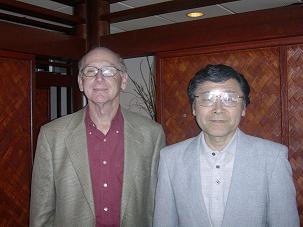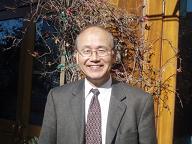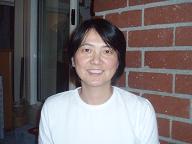コマナー教授とのインタビュー:Interview with Prof. Comanor [インタビュー]
経済教育インタビューシリーズ(4):Economic Education Interview Series(4)
Prof. Comanor (left) 
ウィリアム・コマナーUCLA教授:Mr. William S. Comanor (Professor at UCLA)
12月29日(ロス現地時間では12月28日)にインタビューしたコマナー教授は、米国とカナダで長年経済学を教えた経験に基いて、経済教育については色々な意見を述べられた。以下がそのインタビューの要旨である。
コマナー教授とのインタビュー要旨
第1に、経済学は分析の「方法」であって「対象」が問題なのではない。経済学を教えるというと、人は経済のことを教えると考えがちだが、それは誤りである。経済学を社会学や他の社会科学と区別するものは、それが扱う対象ではなく、希少な資源のあるどんな状況にも適用できるその方法にある。
第2に、経済学では意思決定が制約条件のもとで行なわれることを強調する点が重要である。多くの人は、良い意思決定というのは何を達成したいかをよく考えることだと思っている。それは、最適な決定を行なうための経済学者の方法を理解していないことを意味する。
経済教育において、生徒たちには、意思決定の際は目的だけでなく制約条件をよく考慮するよう教えるべきである。より具体的にいえば、生徒たちに日常生活についても将来の職業選択についても、現実的な制約条件があることに気づくようにすべきであろう。
日常生活では、自分がどれだけ自分自身で使える資金を持っているかを決めることから始める。また資金以外の制約条件、たとえば両親のような自分以外の人たちによって課される制約があることにも気づくべきである。
将来の職業選択について、やりたいことの目的を決めることが重要なのはいうまでもない。しかし既に述べたように、それだけでは十分でない。制約条件を考慮せずに、「夢を追う」ことは無意味である。
このような重要な側面が、日常生活についてであろうと将来の職業選択であろうと、意思決定には常に伴うということを教えてくれるのが経済学に他ならない。この面がほとんど評価されていないのは驚くべきことである。
On 12/29 (12/28 in Pacific Standard Time), I interviewed Prof. Comanor, who had a lot to say about economic education based on his long-time teaching experience at various schools in the US and Canada. The following is a summary of my interview with Prof. Comanor.
Summary of Prof. Comanor's Interview.
First of all, economics is a “methodology” and not a “subject matter.” When you talk about teaching economics, people think that you are talking about the economy, and that is wrong. What distinguishes economics from sociology and other social sciences is not the subject matter but rather the methodology, which can apply to any situation with scarce resources.
Second, economics emphasizes the fact that all decisions are taken under constraints. Most people tend to think that for good decisions all we need to do is think about what you want to achieve. That misses the methodology we economist use to determine optimal decisions.
In economic education, students should be taught the fact that all decisions require identification of the constraints as well as the objectives. In a more concrete terms, they should be aware of realistic constraints, whether in daily living or in future career.
In daily living, they first have to decide how much budge they have. However, all constraints are not monetary constraints. Some constraints are imposed by other people like their parents.
For their future career, students should identify their objectives for sure. But again, that is not sufficient. Just “follow your dream” could be unbelievable non-sense, unless constraints are taken into account.
Economics can tell you these important aspects of decision making, whether it is about your daily living or about your future career. I am startled by how little that is appreciated.
ロス在住のプロとのインタビュー:Interviews with Professionals in LA [インタビュー]
経済教育インタビューシリーズ(3):Economic Education Interview Series (3)
宮崎社長  横山校長
横山校長 
Mr Miyazaki (President, Tokimec USA) Ms Yokoyama (Executive Director, ISMP)
2006年12月28日(現地時間27日)にロス在住の2人の日本人のプロフェッショナルと日本の若者の教育について話し合う機会を持った。国際的なビジネスの世界で活躍するプロが日本の若者をどう見ているか、何を期待しているかを簡潔に述べているので、日本の「経済教育」がどうあるべきかについても参考になると思われる。
宮崎純雄(トキメックUSA社長)とのインタビュー要旨:
米国にはビジネスで忙しく働く一方、ボランティア活動も行なっている人が数多くいる。
私の友人である宮崎氏もその一人で、日本の代表的な精密機械会社のロス・オフィスを統括するとともに、日本の学生がカリフォルニアに来てアメリカのビジネスから何かを学ぶという短期のプログラムをボランティアとして提供している。
宮崎氏によれば、参加する学生たちが将来のキャリア選択についてのヒントを得るとともに、どのようなキャリアを選ぶせよ人生の目的を追求する強いモティベーションも獲得できるようにしたいとのこと。これまで参加した学生は日本の基準からすれば「良い学生」であるが、プログラムで与えられる質問や問題に対して、自分自身の意思を決定し、自分自身の意見を述べることが実に遅く、またそうすることを躊躇する傾向があるという。
宮崎氏は、来年春にはもっとよい長期のプログラムを提供することで、そのような消極的な文化的行動パターンを学生が克服することを可能にしたいという抱負を持ち、将来もっとこのようなプログラムが多く提供され、日本の若者が国際的な環境のもとで成長することを助けるべきという意見であった。それはまさに今後の日本のサバイバルにとって必要なことといえよう。
出典:
http://glocom.blog59.fc2.com/blog-date-20061228.html
横山智佐子(ISMP:国際映画学校・校長)とのインタビュー要旨
本日は以前インタビューした「ISMP」(International School of Motion Pictures:http://www.laismp.com/)の横山智佐子校長のお宅でのパーティーに招待され、ご家族に加えて学校のスタッフと生徒さんにも会っていろいろな話しをうかがうことができた。
横山校長のお話しでは、開校からまだ4ヶ月ほどで生徒数は少ないものの、生徒たちは映画制作全般というよりもそれぞれ専門的な(例えば、音声やプロデュースなどの)興味や能力を持っているので、それぞれのニーズやレベルに合わせて教えることが重要とのこと。それでも生徒たちは、例えばビジュアルなものの感性や扱い方の能力が想像した以上であり、生徒の作品でもSFものなどは卓越した出来だったとのことである。
「いろいろと大変ですが、これからも楽しんで教えていけそうです」と横山校長が力強い声で締めくくられていたのが印象的であった。これからもこのパーティーのような家族的雰囲気で生徒たちと心を通わせながら、本場ハリウッドで通用する映画制作専門家を育てるべく頑張ってほしいものである。
出典:
http://glocom.seesaa.net/archives/20061228.html
以前の横山校長のインタビュー:
http://glocom.seesaa.net/archives/20060622.html
On 12/28 (12/27 in Pacific Standard Time), I had a chance to talk to two professionals currently living in LA about education for Japanese youth. For those who are interested in economic education in Japan, it will be quite helpful and suggestive to hear the opinions of professionals actively engaging in international business as to what can be said about Japanese young people and what can be expected of them.
Summary of Mr. Miyazaki's Interview:
In the U.S., there are quite a few people who are working hard as a businessperson on one hand and as a volunteer on the other. A friend of mine, Mr. Miyazaki, is such a businessman in charge of heading the LA office of a major precision machinery company in Japan, while voluntarily offering a short-term training program for Japanese students to learn from the American way of doing business in California.
Mr. Miyazaki said that he would like participants to obtain some hints for their future careers as well as strong motivation to pursue their objectives in life, whatever career they might choose. Although the students enrolled in his program so far were "good" students by the Japanese standard, they seemed very slow and often hesitant in making their own decisions and expressiong their own opinions in response to the questions or problems given to them on the program.
Mr. Miyazaki wishes to help students overcome such a negative cultural attitude by offering a better and longer program next spring. Hopefully, there will be more programs like this to be offered for Japanese young people to grow in an international environment, and Japan needs it for its survival in the future.
Reference:
http://glocom.blog59.fc2.com/blog-date-20061228.html
Summary of Ms. Yokoyama's Interview:
Today I was invited to a party at Ms. Chisako Yokoyama, Executive Director of the International School of Motion Pictures (ISMP), and talked to her and her family as well as her students and staff members.
Ms. Yokoyama said that although the school just opened four months ago and there are still very few students admitted, she already found it important to adjust teaching programs flexibly to the need and level of individual students, who tend to have their own specialized interests and abilities, for example, in sound technology or production activities. She was pleased with the good (actually better than expected) sense and ability of her students in handling “visual” content in film-making. In fact, the science fiction film made by one of the students was really great, according to Ms. Yokoyama.
She concluded by saying that “I think I will be able to enjoy teaching my students, whatever problems they or I might face in the future.” With such optimism and the family atmosphere prevailing at the party, she will surely succeed in educating students to become professional film-making specialists in Hollywood someday.
Reference:
http://glocom.seesaa.net/archives/20061228.html
Previous Interview with Ms. Yokoyama:
http://glocom.seesaa.net/archives/20060622.html
野口旭教授とのインタビュー:Interview with Prof. Asahi Noguchi [インタビュー]
経済教育インタビューシリーズ(2):Economic Education Interview Series (2)
インタビュー:野口旭氏(専修大学教授) 
Interviewee: Professor Asahi Noguchi (Professor, Senshu University)
http://www.senshu-u.ac.jp/~off0010/faculty/kiz_a_01_noguti.html
12月15日に新宿御苑前にある馴染みの店でよくお会いする野口旭専修大学経済学部教授に、これまで高校生に経済学を教えた経験談をお聞きした。
野口旭氏は、これまで数多くの一般向けの経済学入門書を書かれているが、その関係もあってここ数年、「首都大学東京」で推薦入学の一環として各学校から推薦された受験生が受講する「東京未来塾」というプログラムで経済に関するセミナーを行っている。
そのセミナーは非常に教えがいがあり、また満足する結果が得られているとのことである。もちろん推薦の対象になった優秀な生徒が入学に必要なので熱心に参加することもあるが、それと並んで教える方法に以下のような特徴がある点も大きいと思われる。
(1)最初に一通りの講義をするが、その際に野口教授の著書『ゼロからわかる経済の基本』(講談社現代新書、2002年)などの生徒が経済に興味を持つような内容の教科書を使う。
(2)生徒をグループ分けして、それぞれ自分たちの興味を持つ経済のテーマ(例えば、政府の役割、社会福祉と税、財政金融政策、デフレなど)を選び研究した結果をグループごとにプレゼンさせる。
(3)高校で教えた経験があり高校生の特性をよく知っているアシスタントが指導や支援を適切に行う。
これらのことは、選抜されたモチベーションの高い生徒にかぎらず、一般の高校生に経済学を教える上でも参考になるであろう。しかしそれでも経済に興味を持っていない生徒を教えるのは容易ではない。一案としては、身近な税金などの問題から入って、財政や年金の問題などといった一般市民として知っておくべき経済問題を取り上げていけばいいのではないかというのが野口氏のサジェスチョンであった。
参考文献:
野口旭『ゼロからわかる経済の基本』(講談社現代新書、2002年)
http://www.bk1.co.jp/product/2260210
野口旭教授の著書リスト:
http://www.bk1.co.jp/search/search.asp?kywd=%96%EC%8C%FB%88%AE
On December 15, I had a talk with Senshu University Professor Asahi Noguchi at my favorite place near Shinjuku-gyoenmae, where I often meet him.
Prof. Noguchi has written a number of introductory economics books for general audience and, in that connection, he has been asked by Tokyo Metropolitan University for the last couple of years to teach an economics seminar on the university-sponsored program, “Tokyo Mirai Juku” for those high school students who are recommended by their schools as part of their entrance examination exercises.
Prof. Noguchi says that teaching such students is very satisfying himself with good results. This is not only due to the fact that those students are selected ones with high motivation, but also due to the way the seminar is organized and conducted as follows:
(1) In the initial lecture part, such introductory books as Prof. Noguchi’s book “Understanding Basic Economics From Level Zero Up” (2002) are used as textbooks to motivate students.
(2) Students are told to form small groups, and find and study their group topics (for example, the role of government, social security and taxes, fiscal and monetary policy, deflation, etc.) for their class presentation.
(3) They are advised and supported by an excellent assistant who used to be a school teacher with good understanding of high school students.
These may be helpful in teaching economics to high school students in general, but it would not be easy to motivate those who are not interested in economic issues in the first place. Prof. Noguchi suggested that one idea might be to start with such commonly interested issues as “taxes,” and go on to take up related problems such as “public finance and social security issues,” which every citizen should be aware of.
References:
Noguchi, Asahi “Understanding Basic Economics From Level Zero Up” (Zero kara wakaru keizai no kihon), Kodansha, 2002:
http://www.bk1.co.jp/product/2260210
Prof. Asahi Noguchi’s Authored Books:
http://www.bk1.co.jp/search/search.asp?kywd=%96%EC%8C%FB%88%AE
市川博也教授とのインタビュー:Interview with Prof. Ichikawa [インタビュー]
経済教育インタビューシリーズ(1):Economic Education Interview Series (1)
インタビュー:市川博也氏(経済学博士、上智大学国際教養学部教授)
Interviewee: Dr. Hiroya Ichikawa (Professor, Sophia University)
http://www.sophia.ac.jp/kokusai/kokusai/j/professors/index.html
12月4日に日比谷の外国人記者クラブで市川博也氏と会い、経済教育についての意見をうかがった。
市川氏は慶応義塾大学経済学部卒業後、経団連勤務を経て、上智大学教授に就任。そのため国内外のビジネス界に人脈が多く、実社会の視点から日本の経済教育には批判的な目を向けている。以下が市川氏とのインタビューの要旨である。
まず、経済学を学ぶことが何の役に立つか分からないことが基本的な問題である。単なる知識の断片的な記憶や理解ではなく、経済社会に生きる自分自身の問題として考えるような教え方・学び方が必要。
したがって、自分の人生設計として、キャリア開発と職業選択、所得と消費、貯蓄と投資、ライフサイクルと年金などのテーマを具体的に考えるための資料や分析方法を提供するように工夫すべきである。それらを数値例などで実感できるような教え方をすれば、生徒は現実の経済に興味を示すとともに、日本の経済の制度や政策の問題点も分かるようになり、経済的な思考が深まる一方で政策的な問題意識も高まるであろう。
次の問題として、よく教科書に見られるように「企業は利潤を追求するため環境に配慮しない」といったような短絡的な企業批判や市場批判は決して現実への理解に役立たない。むしろ特に日本では環境保護が企業にとって最重要課題になっており、官民挙げて環境問題に取り組んでいる現実を生徒にも知らせることが、経済社会と自然環境の関係をより現実的により深く理解させるためにも必要であろう。
この点に関して、以下の日本経団連の環境に関する資料が参考になる。
「地球環境憲章」(1991)
http://www.keidanren.or.jp/japanese/profile/pro002/p02001.html
「環境アピール」(1996)
http://www.keidanren.or.jp/japanese/policy/pol094.html
「環境自主行動計画」(2006)
http://www.keidanren.or.jp/japanese/policy/vape
以上が、市川氏とのインタビューの要旨である。
なお市川氏は、フルブライト・メモリアル基金のプログラムで米国からの学校教師のグループに「日本の政治」を講義している。本ブログの11月16日の記事にある写真を参照。
I interviewed Prof. Ichikawa at the Foreign Correspondents’ Club of Japan in Hibiya on December 4, and asked him about economic education in Japan.
Prof. Ichikawa, after graduating from the Economics Department at Keio University, worked for Keidanren before joining the Faculty of Liberal Arts at Sophia University, has a broad network in the business world at home and abroad. Based on his experience, he seems to have a critical view on economic education in Japan. The following is a summary of my interview with him.
First, what is the use of economic education? To answer this question, it is necessary to teach students in such a way that they can take it as their own problem in the real world, rather than studying and memorizing some pieces of knowledge at school.
For example, students should be taught such subjects as career development and job selection, income and consumption, savings and investment, life cycle and social security, etc. for the sake of their own life planning. If these issues are presented with concrete examples, students would be willing and able to acquire the ability to think logically and critically in economic terms.
Second, the treatment of business corporations in economic education needs revision, because corporations are no longer “seeking profit alone and ignoring the environment,” as seen in some textbooks. It is important to let students know the fact that both public and private institutions, including business corporations, are working together to solve environmental problems in Japan, and such knowledge would help students understand the relationship between the economy and the environment more fully.
The following are some materials on this issue published by Nippon Keidanren:
“Global Environment Charter” (1991)
http://www.keidanren.or.jp/japanese/profile/pro002/p02001.html
“Environment Appeal” (1996)
http://www.keidanren.or.jp/japanese/policy/pol094.html
“Voluntary Environmental Action Plans” (2006)
http://www.keidanren.or.jp/japanese/policy/vape
(Prof. Ichikawa sometimes gives lectures to US teachers on the Fulbright Memorial Fund program. See the 11/16 report on this blog.)



